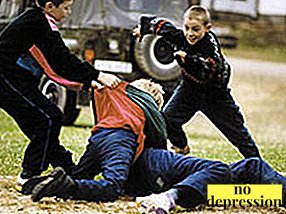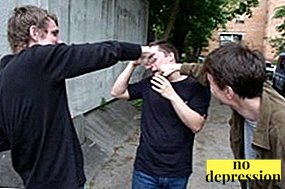Delinquent behavior is expressed in violation of social and legal norms.
Examples of delinquent behavior indicate the public danger of this phenomenon and the need to combat it.
However, delinquent and deviant behaviors have significant differences, which should also be remembered.
Delinquent Concept

Under delinquent understand a person whose actions are antisocial, illegal in nature.
The actions of this subject are in violation of the law.
Misconduct delinquent leads to the occurrence of legal consequences for him.
Delinquent can be adult or teenager.
Special attention of specialists is drawn to the problem of deviant behavior in adolescents, since these representatives of society, due to the age characteristics of their psyche, are at risk.
Timely assistance provided by parents, teachers, representatives of public organizations can exclude the further development of the criminal personality baby
Delinquent behavior - what is it?
This is the behavior that results violation of public order, established norms and laws.
Such antisocial actions lead to the infliction of material, moral damage to individual members of society or the whole society.

Delinquency does not only lead to condemnation of the violator by society, but also to an offensive for him. legal consequences.
The level of the punishment suffered directly depends on the type of the offense committed.
Signs of
Signs of delinquent behavior:
- Antisocial nature of the act. A citizen performs actions that are aimed at violating the foundations in society, the norms of morality and ethics.
- Violation of the law. The actions committed are not only anti-social, but also criminal in nature.
In addition to the violation of unwritten social foundations, there is also the commission of a wrongful act, entailing the onset of legal liability.
- Demonstrativeness. As a rule, acts are demonstrative.
 When they are committed, the criminal seeks to draw attention to himself, to cause a condemnation of society.
When they are committed, the criminal seeks to draw attention to himself, to cause a condemnation of society. - Action conscious. In most cases (with the exception of cases when the offender is declared incapable), the offender is fully aware that his actions are illegal.
Views and examples
- Disciplinary misconduct. Antisocial actions that violate existing norms and rules in society, but do not violate the law.
For such actions, the degree of responsibility is insignificant (fines, reprimands, withholding of income, dismissal from work).
For example: being late for work, violation of labor discipline, violation of labor protection rules, etc.
- Minor administrative offenses. Violation of existing legal norms for which no serious criminal liability is imposed (fines, warnings).
 For example: insults of other persons, drinking alcohol in a public place, indecent gestures, violation of the rules of public movement.
For example: insults of other persons, drinking alcohol in a public place, indecent gestures, violation of the rules of public movement. - Crimes. Offenses for which criminal liability is provided, including imprisonment. For example: theft, drug trafficking, beatings, fraud, murder, etc.
The reasons
As a rule, the formation of delinquent behavior occurs influenced not by one factor, but by their totality.
The prerequisites contributing to the occurrence of problems appear in most cases already in childhood.
Child growing up in an unfavorable environmentare more likely to show antisocial behavior in the future than a child growing up in a favorable atmosphere.
Main reasons appearance of problems:
- physical, psychological violence in the family;
- conflicts between parents;
- lack of attention to children by parents, ignoring their interests;
- lack of discipline in the family, or the presence of excessively strict discipline;
- adult alcohol and drug abuse;
- the commission of adult illegal acts.

External and internal factors
With a more extensive analysis of the conditions causing the formation of delinquent behavior, it is customary to distinguish two of their groups: internal and external.
External conditions:
- family problemswhich are the main reasons for the formation of an asocial type of behavior in a person at an early age;
- underdevelopment of the system of public education of the person: lack of an individual approach, lack of interest in each particular person on the part of the state;
- averaging of the education system, not designed to take into account the characteristics of the emotional, psychological, intellectual development of children.
Internal conditions:
- The physiological characteristics of the individual (impaired mental development, hearing defects, visual defects, bodily features, etc.). Often, people with disabilities or pronounced defects in appearance experience great difficulties during socialization in society. Self-doubt, helplessness, dependence on others, and frequent confrontation with lack of understanding on the part of society can give rise to aggression in a person, striving for antisocial behavior. The society should pay special attention to people with disabilities and prevent their isolation.
- Psychological problems (neuropsychiatric diseases, psychopathy, neurasthenia, etc.). These features of the psyche make people excitable, prone to committing unlawful acts. Such people should be registered in medical institutions and be supervised, since during the period of exacerbation of their diseases they are prone to commit serious crimes.
- Features of adolescence. Adolescents are more susceptible to delinquent behavior due to the peculiarities of the psyche at a given age. They often show increased aggressiveness, unwillingness to follow the norms of society, unwillingness to yield to the requests of parents and teachers.
Adolescents often show a need for risk, prestige, approval, the desire to make an impression and challenge society. Such desires often lead to the commission of illegal acts of a demonstrative nature.
Asocial behavior can independently pass over time as a result of natural age-related changes, and can lead to the formation of an asocial type of adult personality.

Difference from deviant

What is the difference between deviant behavior and delinquent behavior?
Deviant behavior is a violation of the existing norms, principles and rules in society, which does not entail a violation of the law and the onset of legal consequences.
For example, a form of deviant behavior is the systematic use of alcohol by a minor.
Delinquent behavior, as opposed to deviant behavior, is manifested in committing not only antisocial acts, but also offenses for which the appropriate punishment is imposed (fine, imprisonment). For example, a traffic violation.
In other words, deviant behavior is the first kind of delinquent behavior - disciplinary offenses. More often adolescents tend to manifest precisely deviant behavior.
It can easily develop into delinquent behavior if parents, teachers, law enforcement officials do not intervene in time.
Control mechanisms and strategies
The state can use certain mechanisms and strategies to change the situation, prevent its aggravation. There is a fundamental difference in the application of mechanisms and strategies.

Mechanisms - These are specific, specific methods of influence that are coercive or mandatory.
The mechanisms that society should apply to reduce the number of manifestations of delinquent behavior:
- strengthening the punishment system for the acts committed;
- the implementation of indirect control over individuals at risk, through their implementation in groups of law-abiding individuals.
Strategies - This is a general plan of action, designed for a long period of time and aimed at achieving the goal. Strategies for reducing the number of delinquents in society may be as follows:
- Raising the general cultural level of the nation. The higher the level of a person’s spiritual development, the less likely he is to perform an asocial act.
- Improving the quality of life of the population, as a result of which the level of material well-being of the nation will increase, and the need for committing illegal actions to obtain various benefits will decrease.
- Legalization of behavior, being antisocial, but not entailing the onset of legal consequences: vagrancy, prostitution, homosexuality. The ability to act without cover will give the representatives of these social groups and subcultures full-fledged rights in society.
This will save them from having to break the law in an effort to hide their inclinations and interests from society.
- Development of a comprehensive support system: drug, psychological, etc. Support should be aimed at facilitating socialization, adaptation in a society of citizens with various problems.
Prevention

Preventive measuresaimed at solving the problem of delinquency should be carried out comprehensively in the following areas:
- increasing the level of social well-being of families (holding seminars, trainings, consultations);
- individual work of teachers and psychologists with adolescents who show the first signs of problems or have poor heredity;
- reducing the level of crime in society, by increasing the detection of crimes and the prevention of offenses.
Thus, delinquent behavior is a serious problem requiring increased attention from the state. The formation of an asocial type of thinking is laid down in most cases as early as childhood.
Delinquent behavior in psychology and latent crime: analysis, types, meetings in life:

 When they are committed, the criminal seeks to draw attention to himself, to cause a condemnation of society.
When they are committed, the criminal seeks to draw attention to himself, to cause a condemnation of society. For example: insults of other persons, drinking alcohol in a public place, indecent gestures, violation of the rules of public movement.
For example: insults of other persons, drinking alcohol in a public place, indecent gestures, violation of the rules of public movement.

